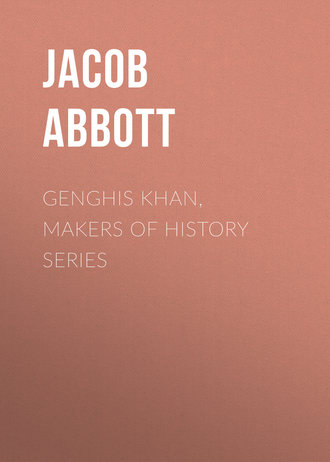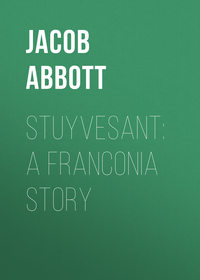
Genghis Khan, Makers of History Series
But in some way or other Jalaloddin detected the deceit, and, instead of surrendering, fought the Monguls with great vigor, and defeated them. He gained a very decided victory, and perhaps this might have been the beginning of a change of fortune for him if, unfortunately, his generals had not quarreled about the division of the spoil. There was a beautiful Arabian horse which two of his leading generals desired to possess, and each claimed it. The dispute became, at last, so violent that one of the generals struck the other in his face with the lash of his whip. Upon this the feud became a deadly one. Both parties appealed to Jalaloddin. He did not wish to make either general an enemy by deciding in favor of the other, and so he tried to compromise the matter. He did not succeed in doing this; and one of the generals, mortally offended, went off in the night, taking with him all that portion of the troops which was under his command.
Jalaloddin did every thing in his power to bring the disaffected general back again; but, before he could accomplish this purpose, Genghis Khan came up with a large force between the two parties, and prevented their effecting a junction.
Jalaloddin's forces dividedJalaloddin had now no alternative but to retreat. Genghis Khan followed him, and it was in this way that, after a time, both the armies reached the banks of the Indus, on the borders of India.
Great battle in the defileJalaloddin, being closely pursued, took his position in a narrow defile near the bank of the river, and here a great battle was fought among the rocks and precipices. Jalaloddin, it is said, had only thirty thousand men at his command, while Genghis Khan was at the head of an army of three hundred thousand. The numbers in both cases are probably greatly exaggerated, but the proportion may perhaps be true.
It was only a small portion of the Mongul army that could get into the defile where the sultan's troops had posted themselves; and so desperately did the latter fight, that it is said they killed twenty thousand of the Monguls before they gave in. In fact, they fought like wild beasts, with desperate and unremitting fury, all day long. Toward night it became evident to Jalaloddin that it was all over with him. A large portion of his followers were killed. Some had made their escape across the river, though many of those who sought to do so were drowned in the attempt. The rest of his men were completely exhausted and discouraged, and wholly unable to renew the contest on the following day.
Orders to take Jalaloddin aliveJalaloddin had exposed himself very freely in the fight, in hopes, perhaps, that he should be killed. But Genghis Khan had given positive orders that he should be taken alive. He had even appointed two of his generals to watch carefully, and to see that no person should, under any circumstances, kill him. He wished to take him alive, in order to lead him through the country a prisoner, and exhibit him to his former subjects as a trophy of his victory, just as he had done and was still doing with the old queen Khatun, his grandmother.
He takes leave of his familyBut Jalaloddin was determined that his conqueror should not enjoy this pleasure. He resolved to attempt to save himself by swimming the river. He accordingly went first, breathless, and covered with dust and blood from the fight, to take a hurried leave of his mother, his wives, and his children, who, as was customary in those countries and times, had accompanied him in his campaign. He found them in his tent, full of anxiety and terror. He took leave of them with much sorrow and many tears, trying to comfort them with the hope that they should meet again in happier times. Then he took off his armor and his arms, in order that he might not be impeded in crossing the river, reserving, however, his sword and bow, and a quiver full of arrows. He then mounted a fresh horse and rode toward the river.
His escape across the riverWhen he reached the bank of the river, the horse found the current so rapid and the agitation of the water so great that he was very unwilling to advance; but Jalaloddin spurred him in. Indeed, there was no time to be lost; for scarcely had he reached the shore when Genghis Khan himself, and a party of Monguls, appeared in view, advancing to seize him. They stopped on the bank when they saw Jalaloddin ride into the water among the rocks and whirlpools. They did not dare to follow him, but they remained at the water-side to see how his perilous adventure would end.
His defiance of his pursuersAs soon as Jalaloddin found that he was out of their reach, he stopped at a place where his horse found a foothold, and turned round toward his pursuers with looks of hatred and defiance. He then drew his bow, and began to shoot at them with his arrows, and he continued to shoot until all the arrows in his quiver were exhausted. Some of the more daring of the Monguls proposed to Genghis Khan that they should swim out and try to take him. But Genghis Khan would not allow them to go. He said the attempt would be useless.
"You can do nothing at all with him," said he. "A man of such cool and determined bravery as that will defy and defeat all your attempts. Any father might be proud to have such a son, and any son proud to be descended from such a father."
Struggles of the horseWhen his arrows were all expended, Jalaloddin took to the river again; and his horse, after a series of most desperate struggles among the whirlpools and eddies, and the boiling surges which swept around the rocks, succeeded at length in carrying his master over. The progress of the horse was watched with great interest by Genghis Khan and his party from the shore as long as they could see him.
Night spent in a treeAs soon as Jalaloddin landed, and had recovered a little from the fatigue and excitement of the passage, he began to look around him, and to consider what was next to be done. He found himself entirely alone, in a wild and solitary place, which he had reason to fear was infested with tigers and other ferocious beasts of prey, such as haunt the jungles in India. Night was coming on too, and there were no signs of any habitations or of any shelter. So he fastened his horse at the foot of a tree, and climbed up himself among the branches, and in this way passed the night.
Jalaloddin meets with friendsThe next morning he came down and began to walk along the bank of the river to see what he could find. He was in a state of great anxiety and distress. Suddenly, to his great relief and joy, he came upon a small troop of soldiers, accompanied by some officers, who had escaped across the river from the battle as he had done. Three of these officers were his particular friends, and he was overjoyed to see them. They had made their way across the river in a boat which they had found upon the bank at the beginning of the defeat of the army. They had spent the whole night in the boat, being in great danger from the shoals and shelving rocks, and from the impetuosity of the current. Finally, toward morning, they had landed, not far from the place where Jalaloddin found them.
Large body of men escapedNot long after this he came upon a troop of three hundred horsemen, who had escaped by swimming the river at a place where the water was more smooth, at some distance below. These men told him that about six miles farther down the stream there was a body of about four thousand men who had made their escape in a similar manner. On assembling these men, Jalaloddin found himself once more at the head of a considerable force.
Pressing wantsTimely aid from JamalarrazadThe immediate wants of the men were, however, extremely pressing, for they were all wholly destitute of food and of every other necessary, and Jalaloddin would have been greatly embarrassed to provide for them had it not been for the thoughtfulness and fidelity of one of the officers of his household on the other side of the river. This officer's name was Jamalarrazad. As soon as he found that his master had crossed the river, knowing, too, that a great number of the troops had attempted to cross besides, and that, in all probability, many of them had succeeded in reaching the other bank, who would all be greatly in want of provisions and stores the next morning, he went to work at once, during the night, and loaded a very large boat with provisions, arms, money, and stuff to make clothing for the soldiers. He succeeded in getting off in this boat before his plan was discovered by the Monguls, and in the course of the next morning he reached the opposite bank with it, and thus furnished to Jalaloddin an abundant provision for his immediate necessities.
Jalaloddin was so much pleased with the conduct of Jamalarrazad in this affair that he appointed him at once to a very high and responsible office in his service, and gave him a new title of honor.
Fate of the sultan's familyIn the mean time, Genghis Khan, on the other side of the river, took possession the next morning of Jalaloddin's camp. Of course, the family of the sultan fell into his hands. The emperor ordered all the males to be killed, but he reserved the women for a different fate. Among the persons killed was a boy about eight years old, Jalaloddin's oldest son.
Sunken treasuresJalaloddin had ordered his treasure to be sunk in the river, intending, probably, to come back and recover it at some future time. But Genghis Khan found out in some way where it was sunk, and he sent divers down for it, and thus obtained possession of it as a part of his booty.
Jalaloddin's endAfter this, Jalaloddin remained five or six years in India, where he joined himself and his army with some of the princes of that country, and fought many campaigns there. At length, when a favorable opportunity occurred, he came back to his own country, and fought some time longer against the Monguls there, but he never succeeded in gaining possession of any substantial power.
SiegesLogs instead of stones for ammunitionModern bombsGenghis Khan continued after this for two or three years in the Mohammedan countries of the western part of Asia, and extended his conquests there in every direction. It is not necessary to follow his movements in detail. It would only be a repetition of the same tale of rapine, plunder, murder, and devastation. Sometimes a city would surrender at once, when the conqueror approached the gates, by sending out a deputation of the magistrates and other principal inhabitants with the keys of the city, and with magnificent presents, in hopes to appease him. And they usually so far succeeded in this as to put the Mongul soldiery in good-humor, so that they would content themselves with ransacking and plundering the place, leaving the inhabitants alive. At other times the town would attempt to resist. The Monguls would then build engines to batter down the walls, and to hurl great stones over among the besieged. In many instances there was great difficulty in obtaining a sufficient supply of stones, on account of the alluvial character of the ground on which the city stood. In such cases, after the stones found near were exhausted, the besiegers would cut down great trees from the avenues leading to the town, or from the forests near, and, sawing the trunk up into short lengths, would use the immense blocks thus formed as ammunition for the engines. These great logs of heavy wood, when thrown over the walls, were capable of doing almost as much execution as the stones, though, compared with a modern bomb-shell – a monstrous ball of iron, which, after flying four or five miles from the battery, leaving on its way a fiery train through the air, descends into a town and bursts into a thousand fragments, which fly like iron hail in every direction around – they were very harmless missiles.
Bringing stonesOccupation of slavesShieldsIn sawing up the trunks of the trees into logs, and in bringing stones for the engines, the Monguls employed the prisoners whom they had taken in war and made slaves of. The amount of work of this kind which was to be done at some of the sieges was very great. It is said that at the siege of Nishabur – a town whose inhabitants greatly offended Genghis Khan by secretly sending arms, provisions, and money to Jalaloddin, after they had once surrendered to the Monguls and pretended to be friendly to them – the army of the Monguls employed twelve hundred of these engines, all of which were made at a town at some distance from the place besieged, and were then transported, in parts, by the slaves, and put together by them under the walls. While the slaves were employed in works of this kind, they were sometimes protected by wooden shields covered with raw hides, which were carried before them by other slaves, to keep off and extinguish the fiery darts and arrows which were shot at them from the wall.
Protection against fireSometimes, too, the places where the engines were set up were protected by wooden bulwarks, which, together with the frame-work itself of the engines, were covered with raw hides, to prevent their being set on fire by the enemy. The number of raw hides required for this purpose was immense, and to obtain them the Monguls slaughtered vast herds of horses and cattle which they plundered from the enemy.
PrecautionsIn order to embarrass the enemy in respect to ammunition for their engines, the people of a town, when they heard that the Monguls were coming, used to turn out sometimes in mass, several days before, and gather up all the stones they could find, and throw them into the river, or otherwise put them out of the way.
Attempts at resistanceIn some cases, the towns that were threatened, as has already been said, did not attempt to resist, but submitted at once, and cast themselves on the mercy of the conqueror. In such cases the Mongul generals usually spared the lives of the inhabitants, though they plundered their property. It sometimes happened, too, that after attempting to defend themselves for some time, the garrison would become discouraged, and then would attempt to make some terms or conditions with the conqueror before they surrendered. In these cases, however, the terms which the Monguls insisted upon were often so hard that, rather than yield to them, the garrison would go on fighting to the end.
Account of KubruHis noble spiritIn one instance there lived in a town that was to be assailed a certain sheikh, or prince, named Kubru, who was a man of very exalted character, as well as of high distinction. The Mongul general whom Genghis Khan had commissioned to take the town was his third son, Oktay. Oktay had heard of the fame of the sheikh, and had conceived a very high respect for him. So he sent a herald to the wall with a passport for the sheikh, and for ten other persons such as he should choose, giving him free permission to leave the town and go wherever he pleased. But the sheikh declined the offer. Then Oktay sent in another passport, with permission to the sheikh to take a thousand men with him. But he still refused. He could not accept Oktay's bounty, he said, unless it were extended to all the Mohammedans in the town. He was obliged to take his lot with the rest, for he was bound to his people by ties too strong to be easily sundered.
Kubru slainSo the siege went on, and at the end of it, when the town was carried, the sheikh was slain with the rest in the streets, where he stood his ground to the last, fighting like a lion.
PusillanimityAll the Mohammedan chieftains, however, did not possess so noble a spirit as this. One chieftain, when he found that the Monguls were coming, caused himself to be let down with ropes from the wall in the night, and so made his escape, leaving the town and the garrison to their fate.
Sorties by the garrisonsThe garrisons of the towns, knowing that they had little mercy to expect from their terrible enemies, fought often very desperately to the last, as they would have done against beasts of prey. They would suddenly open the gates and rush out in large bands, provided with combustibles of all kinds and torches, with which they would set fire to the engines of the besiegers, and then get back again within the walls before the Monguls could recover sufficiently from the alarm and confusion to intercept them. In this manner they destroyed a great many of the engines, and killed vast numbers of men.
Desperation of the peopleStill the Monguls would persevere, and, sooner or later, the place was sure to fall. Then, when the inhabitants found that all hope was over, they had become so desperate in their hatred of their foes that they would sometimes set the town on fire with their own hands, and throw themselves and their wives and children into the flames, rather than fall into the hands of their infuriated enemies.
Mode of disposing of prisonersThe cruelties which the Monguls perpetrated upon their unhappy victims when, after a long resistance, they finally gained possession of a town, were indeed dreadful. They usually ordered all the people to come out to an open space on the plain, and there, after taking out all the young and able-bodied men, who could be made useful in bringing stones and setting up engines, and other such labors, and also all the young and beautiful women, to be divided among the army or sold as slaves, they would put the rest together in a mass, and kill them all by shooting at them with arrows, just as if they had been beasts surrounded in a chase, excepting that the excitement and pleasure of shooting into such a mass of human victims, and of hearing the shrieks and cries of their terror, was probably infinitely greater to their brutal murderers than if it had been a herd of lions, tigers, and wolves that they were destroying.
Prodigious slaughterIt is said by the historians that in one case the number of people ordered out upon the plain was so great that it took four days for them to pass out and assemble at the appointed place, and that, after those who were to be spared had been separated from the rest, the number that were left to be slain was over one hundred thousand, as recorded by the secretaries who made an enumeration of them.
In another case the slaughter was so great that it took twelve days to count the number of the dead.
AtrocitiesSome of the atrocities which were perpetrated upon the prisoners were almost too horrible to be described. In one case a woman, quite advanced in years, begged the Monguls to spare her life, and promised that, if they would do so, she would give them a pearl of great value.
The pearlThey asked her where the pearl was, and she said she had swallowed it. The Monguls then immediately cut her down, and ripped her body open with their swords to find the pearl. They found it, and then, encouraged by this success, and thinking it probable that other women might have attempted to hide their jewels in the same way, they proceeded to kill and cut open a great number of women to search for pearls in their bodies, but they found no more.
Genghis Khan's grandson killedHis mother's revengeAt the siege of a certain city, called Bamiyan, a young grandson of Genghis Khan, wishing to please his grandfather by his daring, approached so near the wall that he was reached by an arrow shot by one of the archers, and killed. Genghis Khan was deeply affected by this event, and he showed by the bitterness of his grief that, though he was so utterly heartless and cruel in inflicting these woes upon others, he could feel for himself very acutely when it came to his turn to suffer. As for the mother of the child, she was rendered perfectly furious by his death. She thought of nothing but revenge, and she only waited for the town to be taken in order that she might enjoy it. When, at last, a practicable breach was made, and the soldiers began to pour into the city, she went in with the rest, and insisted that every man, woman, and child should be put to death. Her special rage was directed against the children, whom she seemed to take special pleasure in destroying, in vengeance for the death of her own child. The hatred and rage which she manifested against children extended even to babes unborn, and these feelings she evinced by atrocities too shocking to be described.
The opinions which Genghis Khan entertained on religious subjects appear from a conversation which he held at one time during the course of his campaigns in Western Asia with some learned Mohammedan doctors at Bokhara, which was the great seat at that time of science and philosophy. He asked the doctors what were the principles of their religion. They replied that these principles consisted of five fundamental points:
Principles of the Mohammedan faith1. In believing in one God, the creator of all things, and the supreme ruler and governor of the universe.
2. In giving one fortieth part of their yearly income or gains to the poor.
3. In praying to God five times every day.
4. In setting apart one month in each year for fasting.
5. In making a pilgrimage to the temple in Mecca, there to worship God.
Genghis Khan's opinionGenghis Khan told them that he believed himself in the first of these articles, and he approved of the three succeeding ones. It was very well, he said, to give one fortieth of one's income to the poor, and to pray to God five times a day, and to set apart a month in the year for a fast. But as to the last article, he could not but dissent from it entirely, for the whole world was God's house, and it was ridiculous, he said, to imagine that one place could really be any more fitting than another as a place for worshiping him.
The spirit of religious bigotryThe learned doctors were much dissatisfied with this answer. They were, in fact, more displeased with the dissent which the emperor expressed from this last article, the only one that was purely and wholly ritual in its character, than they were gratified with the concurrence which he expressed in all the other four. This is not at all surprising, for, from the times of the Pharisees down to the present day, the spirit of sectarianism and bigotry in religion always plants itself most strongly on the platform of externals. It is always contending strenuously for rites, while it places comparatively in the background all that bears directly on the vital and spiritual interests of the soul.
Chapter XXIII
Grand Celebrations
1221-1224The great hunting partyWhen Genghis Khan found that his conquests in Western Asia were in some good degree established and confirmed, he illustrated his victory and the consequent extension of his empire by two very imposing celebrations. The first was a grand hunt. The second was a solemn convocation of all the estates of his immense realm in a sort of diet or deliberative assembly.
The accounts given by the historians of both these celebrations are doubtless greatly exaggerated. Their description of the hunt is as follows:
Object of the huntIt was after the close of the campaign in 1221 that it took place, while the army were in winter quarters. The object of the hunt was to keep the soldiers occupied, so as to avoid the relaxation of discipline, and the vices and disorder which generally creep into a camp where there are no active occupations to engage the minds of the men. The hunt took place in a vast region of uninhabited country, which was infested with wild beasts of every kind. The soldiers were marched out on this expedition in order of war, as if it were a country occupied by armed men that they were going to attack. The different detachments were conducted to the different points in the outskirts of the country, from which they severally extended themselves to the right and left, so as completely to inclose the ground. And the space was so large, it is said, which was thus inclosed, that it took them several weeks to march in to the centre.
The general planIt is true that in such a case the men would advance very slowly, perhaps only a few miles each day, in order that they might examine the ground thoroughly, and leave no ravine, or thicket, or other lurking-place, where beasts might conceal themselves, unexplored. Still, the circle was doubtless immensely large.
The time arrivesWhen the appointed morning at length arrived, the men at the several stations were arrayed, and they commenced their advance toward the centre, moving to the sound of trumpets, drums, timbrels, and other such instruments of martial music as were in use in those days.
OrdersThe men were strictly forbidden to kill any animal. They were only to start them out from their lurking-places and lairs, and drive them in toward the centre of the field.









